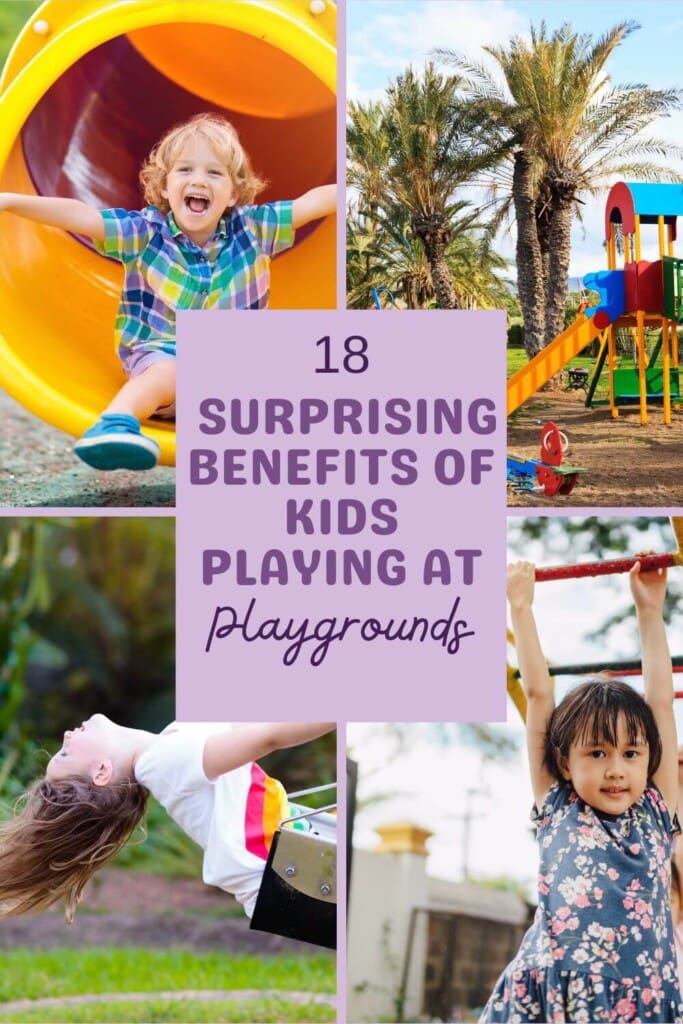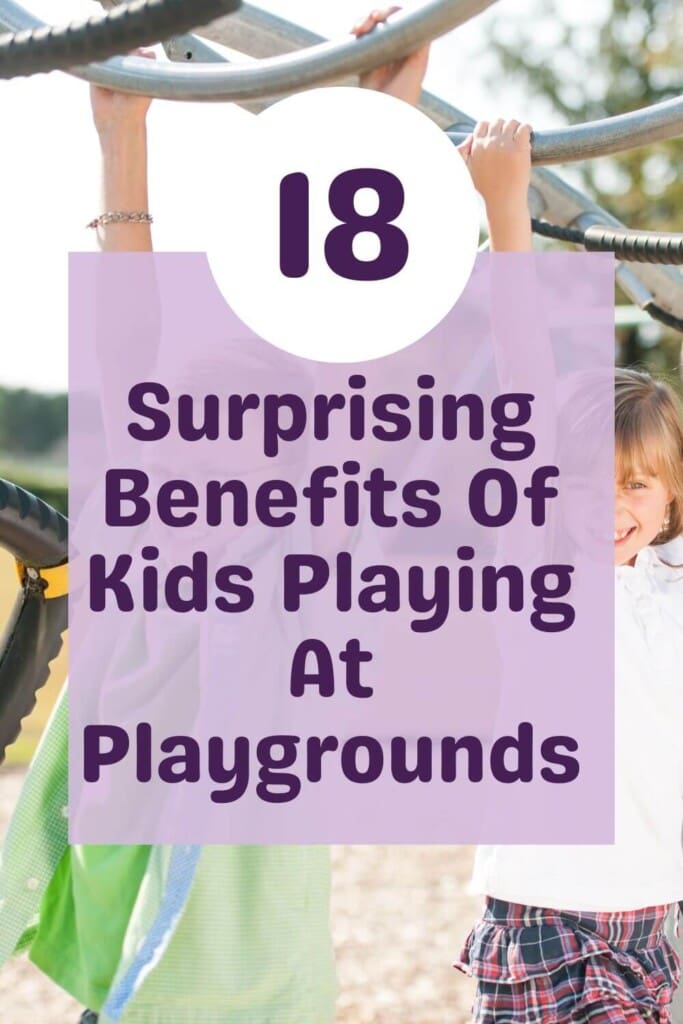18 Surprising Benefits Of Kids Playing At Playgrounds
Have you ever stopped to think about how important play is for a child’s development?
It’s actually a crucial part of their growth and well-being, and playgrounds are one of the best places for them to engage in play.
Not only do playgrounds offer a fun environment for kids to run around and play, but they also provide numerous benefits for their physical, cognitive, social, emotional, and educational development.
In this article, we’re going to explore 18 surprising benefits of kids playing at playgrounds. Trust us, you won’t want to miss out on these!
Heads up: This post may include affiliate links. As an Amazon Associate, I earn from qualifying purchases—at no extra cost to you. Full privacy policy and disclosure here.

Physical benefits of playing at playgrounds
Playing at playgrounds offers many physical benefits for children. Here are some of the ways that playgrounds can help improve a child’s physical health:
- Enhancing gross motor skills: Climbing, jumping, swinging, and running on the playground can help kids develop their gross motor skills, which involve large movements of the body.
- Developing coordination and balance: Playground equipment such as monkey bars and balance beams can help children develop their coordination and balance, which are important skills for everyday activities.
- Building strength and endurance: Playing on playground equipment can help kids build strength in their muscles and bones, as well as improve their endurance over time.
In short, playgrounds are a great place for children to get moving and work on their physical development in a fun and engaging way.
Cognitive benefits of playing at playgrounds
In addition to the physical benefits, playing at playgrounds also offers many cognitive benefits for children. Here are some of the ways that playgrounds can help improve a child’s cognitive development:
- Stimulating creativity and imagination: Playground equipment can inspire children to use their imaginations and engage in creative play, such as pretending to be pirates on a ship or astronauts on a rocket.
- Improving problem-solving and decision-making skills: Playgrounds can provide opportunities for children to problem-solve and make decisions, such as figuring out how to climb to the top of a structure or choosing which equipment to play on.
- Boosting cognitive flexibility and executive function: Playgrounds can also help children develop cognitive flexibility and executive function skills, such as planning, prioritizing, and adapting to changing situations.
In short, playgrounds are not just a fun place to play, but also a place where children can exercise their minds and improve their cognitive abilities.
Social benefits of playing at playgrounds
Playing at playgrounds also offers many social benefits for children. Here are some of the ways that playgrounds can help improve a child’s social development:
- Encouraging social interaction and communication: Playgrounds provide a space for children to interact with others and practice their communication skills, such as sharing equipment and taking turns.
- Fostering empathy and emotional intelligence: Playground play can help children develop empathy and emotional intelligence by encouraging them to consider the feelings and perspectives of others.
- Building teamwork and cooperation skills: Playing on playground equipment with others can also help children learn teamwork and cooperation skills, such as working together to complete a task or achieve a goal.
In short, playgrounds can provide children with valuable opportunities to develop their social skills and learn how to interact with others in a positive and constructive way.
Emotional benefits of playing at playgrounds
Playing at playgrounds can also offer many emotional benefits for children. Here are some of the ways that playgrounds can help improve a child’s emotional well-being:
- Reducing stress and anxiety: Engaging in physical activity and play on the playground can help children release stress and anxiety, promoting a more positive and relaxed mindset.
- Enhancing self-esteem and confidence: Accomplishing physical feats on the playground, such as climbing to the top of a structure, can help children build self-esteem and confidence in their abilities.
- Improving mood and promoting happiness: Playing on the playground can help children release endorphins, which are feel-good hormones that can improve mood and promote happiness.
In short, playgrounds can provide a space for children to improve their emotional well-being and develop a more positive outlook on life.
Educational benefits of playing at playgrounds
Playing at playgrounds can also offer many educational benefits for children. Here are some of the ways that playgrounds can help improve a child’s education:
- Promoting sensory exploration and learning: Playgrounds can offer opportunities for children to explore and learn through their senses, such as feeling different textures or hearing different sounds.
- Improving spatial awareness and geometry skills: Playground equipment can help children develop spatial awareness and geometry skills, such as understanding distance and direction.
- Enhancing critical thinking and problem-solving skills: Playground play can encourage children to think critically and solve problems, such as figuring out how to navigate a new structure or equipment.
In short, playgrounds can be an important part of a child’s education, providing opportunities for them to learn and develop important skills in a fun and engaging way.
Health benefits of playing at playgrounds
Playing at playgrounds offers a wide range of health benefits for children. Here are some of the ways that playgrounds can help improve a child’s health:
- Promoting physical activity and reducing sedentary behavior: Playground play can encourage children to engage in physical activity and reduce sedentary behavior, which is important for maintaining a healthy weight and reducing the risk of chronic diseases.
- Supporting cardiovascular and respiratory health: Physical activity on the playground can help children strengthen their heart and lungs, which is important for supporting cardiovascular and respiratory health.
- Boosting immune function: Playing outdoors on the playground can help expose children to sunlight, fresh air, and nature, which can boost immune function and reduce the risk of illnesses.
In short, playgrounds can be a valuable tool in promoting the overall health and well-being of children.

Get Your Free Download
Love this Post? Pin it!

More Like This
- Backyard Activities For Toddlers
- Summer Bucket List For Kids To Great Create Summer Memories
- Kids Need The Outdoors, And Here’s How To Get Them Off The Couch
- 111 Exciting & Simple Outdoor Activities For Kids
